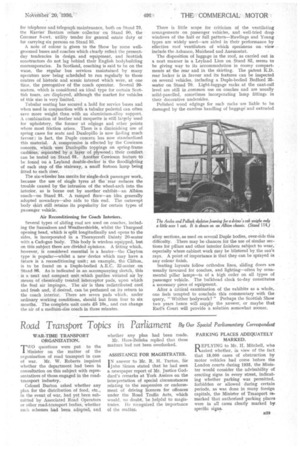Road Transport Topics in Parliament By Our Special Parliamentary Correspondent
Page 53

If you've noticed an error in this article please click here to report it so we can fix it.
WAR-TIME TRANSPORT ORGANIZATION.
TWO questions were put to the Minister on the matter of the organization of road transport in case of war. Mr. W. Roberts inquired whether the department had been in consultation on this subject with representatives of those engaged in the roadtransport industry_
Colonel Burton asked whether any plan for the distribution of food, etc,, in the event of war, had yet been submitted by Associated Road Operators or other road-transport bodies, whether such schemes had been adopted, and whether any plan had been made. Mr. Hore-Belisha replied that these matters had not been overlooked.
ASSISTANCE FOR MAGISTRATES.
I N answer to Mr. R. H. Turton, Sir John Simon stated that he had seen a newspaper report of Mr. Justice Goddard's remarks at York Assizes on the interpretation of special circumstances relating to the suspension or endorsement of driving licences for offences' under the Road Traffic Acts, which would, no doubt, be helpful to magistrates. He recognized the importance of the matter.
PARKING PLACES ADEQUATELY MARKED.
REPLYING to Mr. H. Mitchell, who asked whether, in view of the fact that 18,000 cases of obstruction by motor vehicles had come before the London courts during 1935, the Minister would consider the advisability of erecting signs in every street, indicating whether parking was permitted, forbidden or allowed during certain periods, as was done in many foreign capitals, the Minister of Transport TOmarked that authorized parking places were in all cases clearly marked by specific signs.




























































































